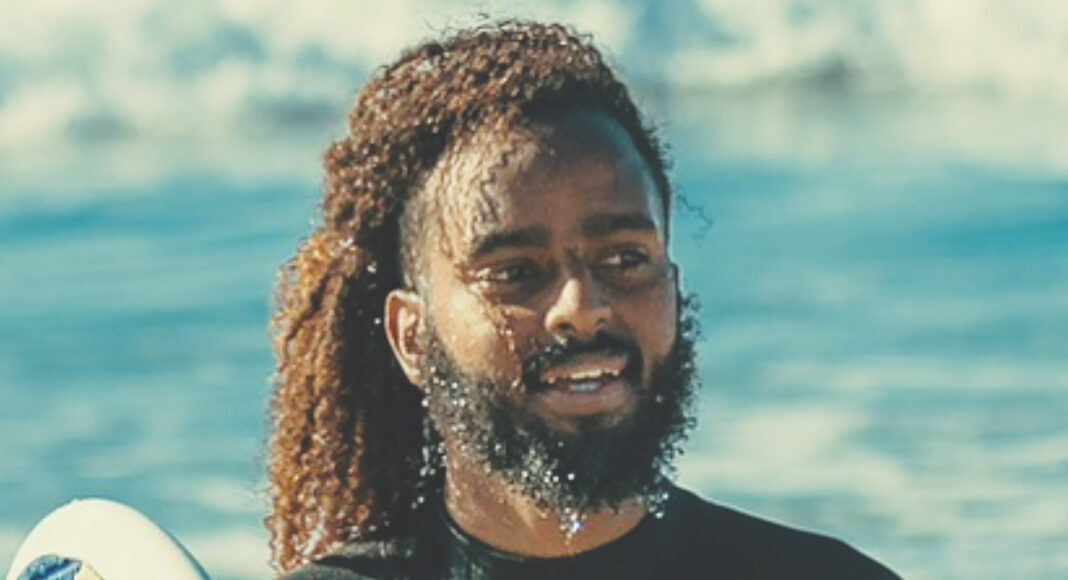If the surfing world mirrors society, Santa Cruz has the privilege of holding up a beautiful, full-length mirror. The question then becomes: What do we want it to reflect? To care about diversity, representation, inclusion and justice, whether or not we’re surfers ourselves, means to factor in what our lineups look like.
At Troubled Waters, a presentation, Q&A and community discussion about diversity and racism in surfing, surfer/activist/Black Surf Santa Cruz founder Esabella Bonner, Black.Surfers founder Kayiita Johnson, surfer/historian/anthropologist Paul Richardson and artist/activist/Decolonize The Surf creator David Crellin will discuss and examine the history of representation in surfing. The panelists will lead a conversation on ways to help make contemporary surf culture more inclusive and welcoming.
“Surfing offers this perfect lens and opportunity to see certain ‘isms,’” Bonner says. “Whether sexism, racism, classism or able-ism—surfing is a lens into greater systemic issues. Calling out the history, calling out that we’re living in troubled waters, that’s how we actually dismantle these things and reimagine how things should be.”
The topic inspired what became the heart of Crellin’s Digital Arts and New Media MFA thesis project at UCSC, which developed into a gallery exhibit and later evolved into Decolonize The Surf. The interactive project reaches broad audiences using a QR-coded sticker—surfers have been putting them up around breaks statewide—leading to a website that’s become a movement based on learning about and working to eradicate racism in surfing.
Troubled Waters came about as an extension of conversations that began when Crellin reached out to Bonner, Johnson and Richardson while researching the original Decolonize The Surf project.
“The work they, and so many others, are doing is urgent and necessary,” Crellin says. “They were incredibly generous with their time, knowledge and friendship. As a white artist and activist making a commitment to creating anti-racist work, their insights, inspiration, support and guidance were, and are, invaluable to me.”
Bonner emphasizes how much the panelists’ missions are aligned. She founded the organization to “promote physical, spiritual and communal healing through surfing, recreation, education and advocacy,” which is aligned with Decolonize The Surf, Black.Surfers and, of course, the event itself.
All originally stem from “truth-telling and acknowledging that we are living in troubled waters.” Bonner adds that segregation and separation in the water can be repaired through events and storytelling that recognizes “the true history and root of the problem and gives us an opportunity to heal together. This comes from being able to acknowledge that we have a problem in the first place.”
Crellin says that contemporary barriers to ocean access for BIPOC (Black, Indigenous and People of Color) include “showing up at a community that’s exclusively white,” the challenges of getting to the water, put into play by “the systems” and created systemic racism.
For instance, while researching Decolonize The Surf, Crellin learned that a 10-minute bike ride from where he grew up was Bruce’s Beach. This Manhattan Beach resort welcomed Black beachgoers in the early 1900s. In the 1920s, the local government took the resort and finally returned it to the Bruce family in 2022. Crellin offers a quote from artist, activist and academic Lilla Watson to help describe his passion for this work: “If you have come here to help me, you are wasting your time, but if you have come because your liberation is bound up with mine, then let us work together.”
For Troubled Waters, the Santa Cruz Museum of Art and History is offering a collaboration. Director of Exhibitions and Programs, Marla Novo, met with Crellin to discuss ways the permanent surfing exhibition in the History Gallery could be more inclusive.
“Collecting, preserving and sharing stories” is the heart of the museum’s mission. They decided to “start the discussion.” “The MAH is honored to host talks like Troubled Waters,” Novo says. “We do this by creating spaces for our community to connect, create and share.”
The MAH has also worked with Bonner and Black Surf Santa Cruz. Crellin hopes the event opens up “a conversation about issues of representation and race in the surfing community, and stimulates an honest, if at times, uncomfortable look at how surfing can be more accountable, on a personal level and in the sport as a whole.”
He hopes attendees think about the issues and what comes up for them. Crellin suggests attendees ponder questions like, “What is it that they don’t know or understand? Where do they feel awkward, challenged or unsure? What do they think surfing needs to do to be more diverse and inclusive? And what might they be prepared to do to help change surfing for the better?”
Bonner encourages the opportunity to view “this work—such as antiracism—as a verb, something to actually do.” She hopes the audience arrives “with an open mind, a curiosity to learn more and intention to act upon the information and do something differently. I hope that’s the mindset.”
Crellin also advises researching the organizations working on representation and diversity in surf culture. Black Surf Santa Cruz, Black.Surfers, Brown Girl Surf and Native Like Water, are just a few examples.
“The information is out there if you look, and it’s a great way to start to learn about it and what you can do to make a difference,” Crellin says.
Troubled Waters: The Ocean as Contested Space in Surf Culture happens Friday, Feb. 17, 6-7:30pm at the MAH Garden Room, 705 Front St., Santa Cruz. Free (with museum admission). santacruzmah.org













